It is not often MT gets to interview three recent winners of the Motor Transport Service to Industry Award who between them have almost 150 years’ experience in the transport industry.
But this rare opportunity came about in August this year when Culina Group CEO Thomas van Mourik, his deputy William Stobart and non-executive director Glyn Davies agreed to run through their plans for the £2.2bn a year 3PL, which will probably leapfrog DPD to take third place in this year’s MT Top 100 behind only Royal Mail and DHL Supply Chain.
Davies has been a non-executive director for 14 years and brings a lifetime of experience in the logistics industry having started his first business Russell Davies in 1974. He has set up and sold three more successful companies since, the last being truck dealer Hanbury Riverside which he sold to Asset Alliance Group in 2018.
Stobart joined the family firm at the age of 15 in 1976 and has spent most of his working life with Eddie Stobart through its changes in ownership that eventually saw it back in private hands when it was bought in 2021 by Culina Group, which is still 100% owned by the Müller family.
Set up by van Mourik in 1994 in Market Drayton as Müller Dairies’ UK distribution arm, Culina Group has grown steadily through a series of strategic takeovers and now includes Culina Logistics, Fowler Welch, CML, MMiD, Stobart, Stobart Europe, Great Bear, Warrens, The Pallet Network, International Road Ferry, iForce, IPS, The Logistics People.
While each subsidiary continues to operate as an autonomous unit, van Mourik is shaping the business into national ambient and chilled networks and the group’s 4,000 trucks and over 9,000 trailers are all operated under the umbrella of Culina Asset Management, with overall responsibility sitting with William Stobart. A third division, Industrial Support Services, pulls together the group’s e-commerce fulfilment, contract packing and labour resource provision while CML, a supplier consolidation operation, provides services specifically for discount retailers and MMiD runs the milk operation for Müller Dairies with a separate fleet of 1,000 trucks.
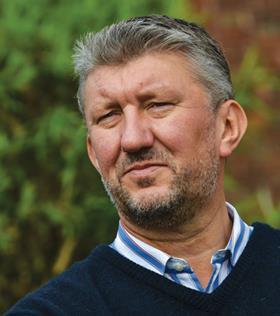
Van Mourik, pictured, is also focusing more of Culina Group’s 20m sq ft of warehousing into the Great Bear ambient business and more of the transport operation into Stobart. But his argument for avoiding other groups’ error of absorbing acquisitions completely into the parent is clear. “Customers will still deal with Great Bear, Stobart or any of the other businesses in the group which have retained their identities” he says.
“Probably one of the biggest mistakes I could make is turning it all into Culina.”
There have been a couple of exceptions to this rule in that AIM and Robbie Burns have gone into Fowler Welch, though the management of both businesses have stayed on.
Enabling the operating companies to share resources has enabled Culina Group to reduce its overall fleet and headcount through efficiency gains, but customer service remains king.
“Ultimately we will end up with a control tower that will recommend how a particular flow is handled,” says van Mourik. “But service levels come first and the rest will follow. We also try to keep cost within the business as much as possible.
“We will always use subcontractors but we can use a few less if we get ourselves organised better.”
Coping with peaks in demand is made easier by the large number of trampers that Stobart still operates, contrary to trends elsewhere in the haulage sector.
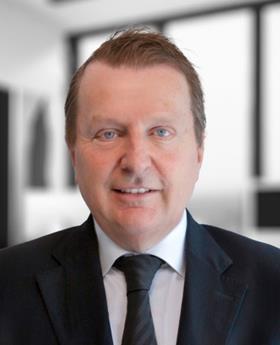
“We find it easy to get trampers as so many drivers want to tramp, especially at night and weekends,” says Stobart, pictured. “They are getting a good wage and are flooding back into the industry. Give them a good truck with a microwave and a shower and they will stay.”
The trampers are allocated brand new trucks and the majority of the time they are the only driver of the vehicle – still 50% Scania R-series – for their first year before they go on to be double-shifted elsewhere in the business.
To streamline the group further the management is rolling out a group-wide SAP enterprise resource planning system that will centralise 18 existing separate finance and HR functions.
The different businesses also still operate a variety of inherited transport management systems and the company is planning to standardise the chilled network on one platform and the ambient network on another.
“We have all sorts of transport systems at the moment and that is unsustainable long term,” van Mourik says. “Equally we have a variety of warehouse management systems, some of which are bespoke, and do we want to carry on rolling them out or go for the system that has been a great success within the businesses?”
“In the long term it would be great to have SAP - responsible for finance and HR, one or two warehouse and transport management systems and one vehicle management system.
“We will then carry on growing organically and by acquisition. Certain deals we have talked about haven’t come off yet largely as a result of the economy and I want to see where we are going in 2024.”
Through iForce, Culina Group is a major player in e-fulfilment and has benefited from the boom in online retail. One area van Mourik had looked at was home delivery and while he says the prices of companies in this space have “come down a lot” he wants to wait and see how the UK economy performs before committing.
“If I compare the FMCG volumes we shifted against where we should have been we are 10% down across the business,” he says. “We haven’t lost any customers, it is just because we are all buying less as everything is so expensive.
“I want to see the dust settle.”
Van Mourik does not see any natural limit on the size of Culina Group, which doubled in size in 2021 with the acquisition of Stobart parent GreenWhiteStar Acquisitions (GWSA).
“You can never say it is big enough because when you stop growing you go backwards,” he says. “We have aspirations to grow but it has to be profitable. Nobody is holding a gun to our head saying we must achieve XYZ in the next couple of years. If the opportunity is there we will grow but if the market isn’t ready for a new move we don’t need to do it.
“It is a relatively relaxed position to be in. We are not a PLC.”
Culina only buys strong companies with good management.
“We have no time to start rebuilding businesses, we just want plug and play,” says van Mourik. “When we bought GWSA all the so-called bad things had already been dealt with and all the plans about how we were going to take it forward strategically had already been agreed up front as part of the due diligence process.
“Two years on, nothing has changed to our plan.”
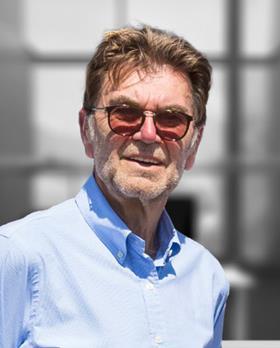
Davies, pictured, has plenty of experience of buying and selling businesses and agrees 100% with van Mourik.
“If you buy a basket case it will have poor management,” he says. “So it’s not a bargain unless you can just bolt the revenue onto your existing network which is rare.
“This downturn in the market is helping us in a way. It is giving us the opportunity to look at the business and consolidate across the group.”
But van Mourik is quick to point out that this does not mean a pause in the growth strategy. “It won’t stop us picking up one or two things,” he says. “If we see an opportunity we will certainly engage.”
Culina Group’s chilled network is however now very nearly complete and van Mourik says there isn’t much left in that market worth buying. Stobart pulled out of chilled transport 10 years ago because stiff competition had driven rates down below costs and van Mourik says it is still a tough market.
“The entry barrier is not cheap and even for the players left to go out and make a major investment in a new warehouse is not easy,” he says. “The levels of automation required are also increasing. It works where you have one long term customer and the pallets are all the same size and weight, like we have with Müller at Market Drayton, for example, but is more difficult to automate warehouses for multiple customers.”
More automation is however inevitable as the tight labour market exacerbated by Brexit is making it more expensive to employ warehouse staff.
“The driver problem has more or less gone away because of the pay adjustment we have all made,” says van Mourik. “But in the warehouse the labour shortage is still there and turnover is high, especially in a cold environment.
“We are seriously looking at automation in both ambient and chill.”
As well as higher labour and warehousing costs, prices of new trucks and trailers have rocketed, and Culina Group is having to pass some of these increases onto customers.
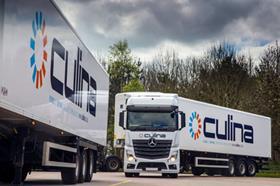
“They have had to take quite a bit as there is only so much we can absorb,” says van Mourik. “Lead times on new trucks have come down but prices are a lot higher.
“Electric trucks will be even more expensive and we can’t afford that. I think everyone is in denial at the moment.”
While a large majority of Culina Group’s activity is in the UK it is growing its continental European business. Stobart Europe’s general cargo division is run from Bulgaria and Belgium and provides pan-European transport plus warehousing in Belgium and Germany. International Road Ferry (IRF), acquired in January 2023, specialises in short sea mainly unaccompanied trailer movements between the Netherlands, Germany, Switzerland and the UK. IRF is now shipping around 70 trailers a day in and out of the UK.
“Culina Group never really got involved in collecting or organising trailers from the continent for our customers,” says van Mourik. “It was the next opportunity as we can only go so far here in the UK. I wouldn’t say we are at the end of the journey but we have to be careful with the Competition Commission so are looking more towards Europe - in a controlled manner.
“We are looking at other acquisitions that can support that.”
Brexit is still causing friction on the UK’s borders with the EU and the island of Ireland, and avid free trader van Mourik still finds it hard to accept.
“Tell me one good thing that has come out of Brexit,” he says. “It was all about emotion. The EU is our biggest trading partner and it is a real problem. But we are where we are and have to get on with it.”
While some European hauliers are avoiding the UK because of border delays, the imbalance in our physical trade remains and finding profitable loads from the UK to the continent is a growing problem.
“The imbalance will probably get worse,” predicts van Mourik. “Manufacturing is shrinking further and further as the UK becomes a service economy.”
Delivering sustainable solutions
Culina Group’s strapline is ‘Delivering Sustainable Solutions’ and while it is experimenting with alternative fuels including electric vehicles its immediate priority is to run the existing fleet as efficiently as possible by sharing capacity and reducing empty miles. As a result the group fleet achieves an impressive 86% load fill, well above the industry average of 72%.
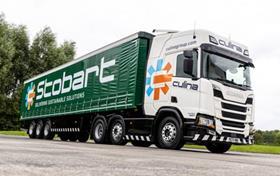
Stobart is testing two electric refrigeration units partially powered by solar panels on the trailer roof, but is finding them operationally more restrictive than conventional diesel engine-powered versions.
“They only work on a hot, sunny day when the fridges are working harder and we have to plug them in as soon as they arrive at the DC to maintain the temperature,” he says. “They are not as versatile. It works on a straight A to B journey but I can’t put them in the network.”
Culina Group was among the pioneers of electric fridges back in 1994 but van Mourik says they did not perform.
“I had to give them up on them,” he says. “When they came into our yard I could plug them in but everywhere else it was a disaster.”
Van Mourik is however well aware of the increasingly pressing need to find alternatives to diesel trucks and fridges.
“The industry has to find a solution,” he says. “The truck manufacturers are committed to going electric and trailers will be the same.
“Sooner or later the industry will have to bite the apple. What is for sure is that distribution costs will be affected by the change needed.”
Squaring the circle of decarbonisation and affordable transport remains a challenge however.
“Customers are coming to us saying we have to deliver sustainable solutions and we are asking our suppliers to help us with this,” says Davies. “We are all looking at each other and no one wants to pay.
“We can’t be the innovators here. We are reacting to market pressures whether that is customers or government – and that is what we have always done.”
Trains still on track at Stobart
Stobart operates the UK’s largest domestic rail freight service carrying just-in-time products for the retail sector and has designed its own 44ft curtain sided rail container for multimodal operations. Stobart Ports handles cargoes imported through Felixstowe and Southampton and uses rail terminals around the UK to forward freight to its DCs for onward delivery.
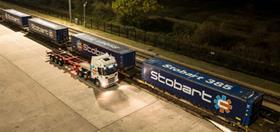
“Stobart Ports has always been multimodal,” says William Stobart. “We have developed it and revenues have increased 38% year on year.
“Our curtainsided trailer is the only one running in the UK. It is carrying plasterboard and cola up and down to Scotland from Daventry.
“It works for shared users, but we have to have control at both ends. The biggest challenge for rail is the height.”
A doubledeck road trailer can be up to 4.9m high in the UK whereas the maximum height on the railway is 2.9m.
Stobart started running daily trains from Daventry to Grangemouth for Tesco back in 2006, adding a weekly service from Valencia in southern Spain to Dagenham three years later, and almost 20 years on rail has a growing future with the Stobart business.
“Everybody is now looking at trains,” says Davies. “Rail isn’t top of our list but we see it as our responsibility to develop more sustainable solutions.”
Busting the myth of a Culina Group listing
Before our interview, MT had been contacted by a number of people who had seen a prospectus for a sale of shares in Culina Group valuing the business at £1.5bn. But van Mourik was keen to quash rumours of any impending listing.
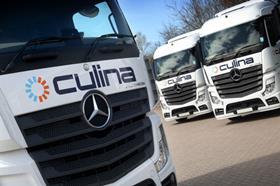
“The Müller family received an unsolicited approach by an international broker who said, ‘if you ever want to sell Culina Group or Muller now is the time’,” he says. “Theo Muller is now 83 so he asked what value the broker would put on them. An enquiry was made in the marketplace and certain big shipping lines would have seen it, and that is how this rumour came about.
“Will anything be done with it – no. It is a bit like getting your house valued even if you are not selling. The only thing Theo has ever sold was a restaurant chain and it took years to convince him it wasn’t core and should be sold. He’s happy now because that was just before Covid!
“Culina Group is not for sale.













